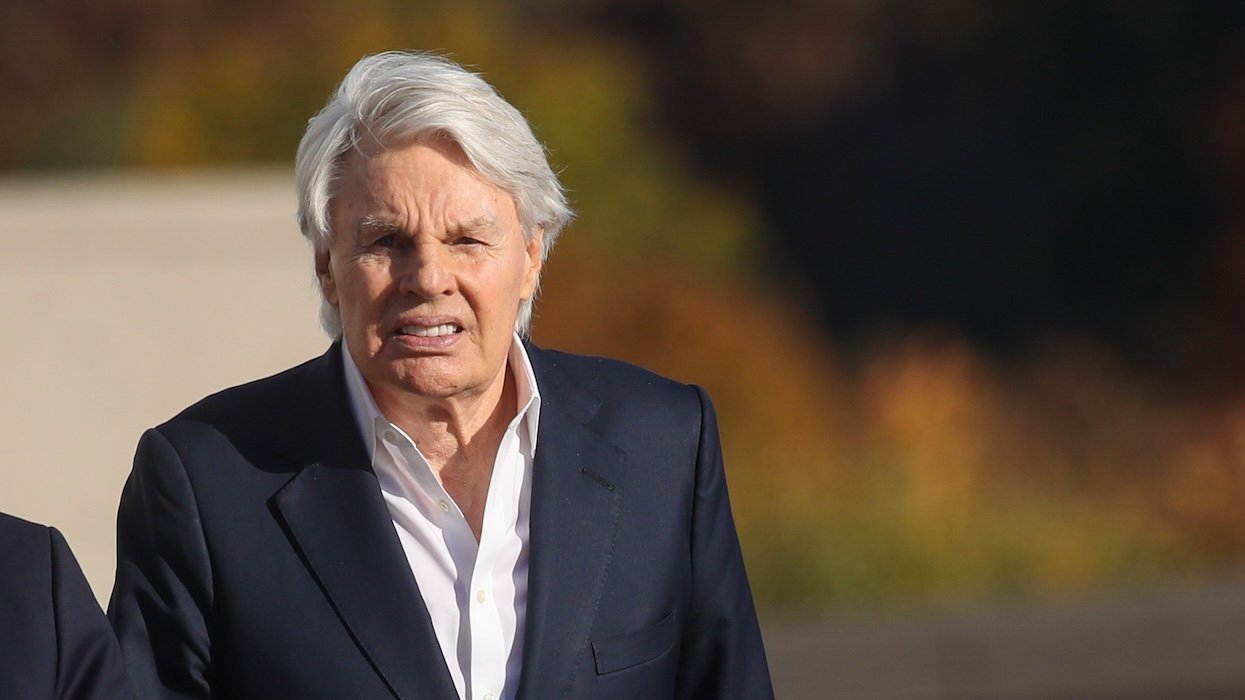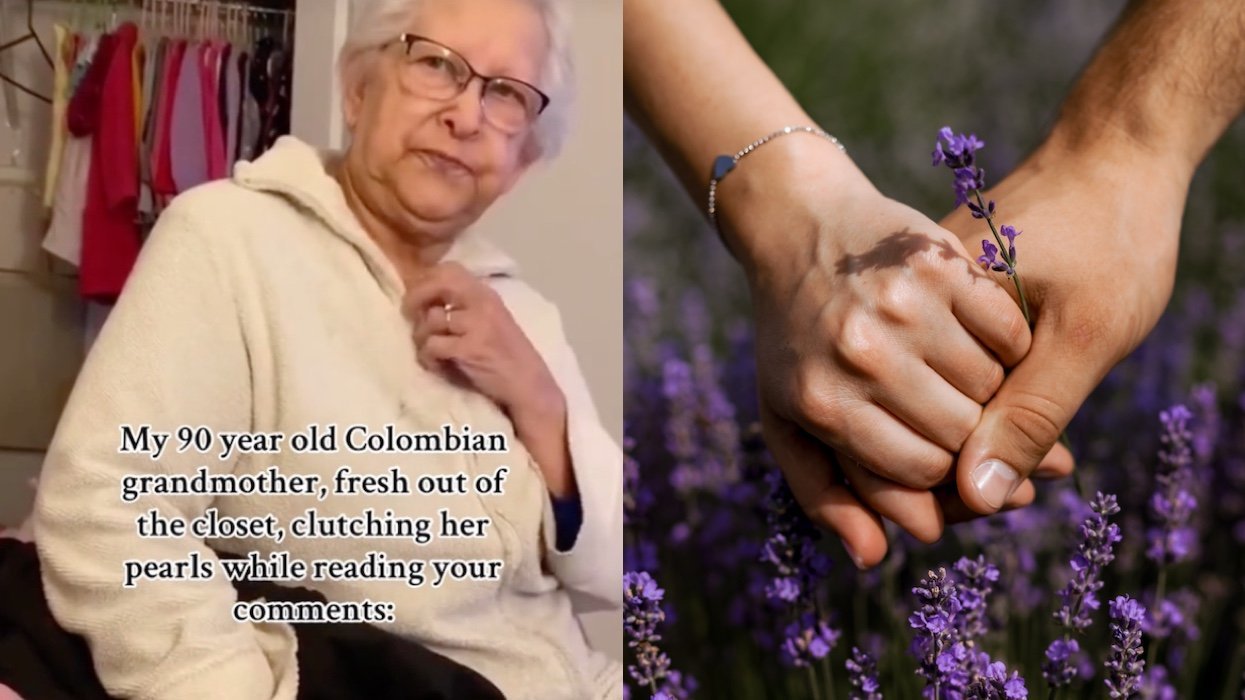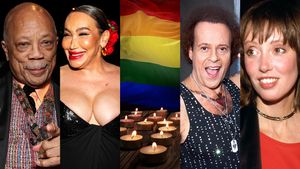I am a queer cisgender woman partnered with a queer transgender man. Because both my partner and I identified as queer before we met -- and because I met him after he began his transition -- we've never had to navigate the often tumultuous waters of being in love while one partner transitions.
Instead, we find ourselves often navigating the equally murky waters of fighting to be visible in a culture that broadly perceives us as heterosexual. I'm aware that there are cis-trans couples where one or both partners identify as straight, gay, lesbian, bisexual, or pansexual -- that just isn't us. It never has been, and it's always been important to us both to be out and open. It's our little form of personal activism.
But being the partner of someone who is part of a minority community that, at best, is enjoying some supposedly newfound "fascination" focus in the media has its own set of challenges. These are just a few of those challenges I've encountered, and heard reflected back from other women partnered with trans men:
 1. We will fight for our loved ones -- even when our partners wish we wouldn't.
1. We will fight for our loved ones -- even when our partners wish we wouldn't.
I call this my "Mama Bear" instinct, in an effort to make adorable something I'm pretty sure annoys my partner.
Over the years, my partner has built up a necessarily thick skin when it comes to transphobic microagressions -- the intentional misgendering, invasive questions, or challenges to his identity. My skin is notably thinner -- and I don't think I'm alone in that.
Perhaps because we, as cis people, aren't used to experiencing such slights on a daily basis, we tend to be quicker to go on the defensive. I am the first to climb atop my soapbox when I believe someone has slighted my spouse. I speak out -- loudly -- when I think that someone is disparaging him, using his old name, making a transphobic joke, or just generally prying where it's none of their business.
Most of the time, while I'm gearing up for righteous rant, my partner is quietly shaking his head, telling me that it's really not that big of a deal.
I'm slowly starting to realize that my readiness to anger is about witnessing discrimination with which I'm personally unfamiliar: I've never had someone tell me I was in the "wrong" bathroom, for example, or that I didn't "look" like the gender I identify as. So I get inordinately worked up and ready to defend my partner's honor, even when he would rather just go about his day, letting whatever slight it was roll off his back.
 2. Many of us know each other.
2. Many of us know each other.
As far as I know, there is no secret trans person communication group that serves to connect and introduce everyone under the trans* umbrella to one another. (Then again, if there were, this cis woman wouldn't be privy to that group.) Consequently, as The Good Men Project correctly asserted, not all trans people know each other. But I'd be lying if I said there weren't several occasions where I've thought I was meeting someone for the first time, only to realize that I've crossed paths with them -- or their trans* partner -- before. (Admittedly, this might say more about the queer social bubble I hang out in than about partners of trans folks generally.)
 3. We don't want to tell you about our sex lives.
3. We don't want to tell you about our sex lives.
Unless we've invited you to be a part of our sexy times, I don't have any interest in offering you a play-by-play of how my spouse and I get down. And no, I'm not going to tell you what his junk looks like.
 4. But we would rather field your inappropriate questions than have you invade our partner's privacy.
4. But we would rather field your inappropriate questions than have you invade our partner's privacy.
I've often been told that trans folks get really tired of being a walking, talking, breathing encyclopedia on everything trans. If I can filter a few of your prying questions before they reach my partner, I am entirely willing to do that.
Sure, I'll likely tell you to Google the answers to your questions, but I might just take the time to explain to you why it's not OK to ask what my partner's old name was or whether he's had "the surgery."
And here's a freebie: Don't ever ask someone if they've had "the surgery." There is no single surgery that all trans people desire, and more importantly, not all trans people desire or have access to surgery, hormones, or medical interventions of any kind. Also, like the inquiries about someone's sex life, it's just none of your business.
 5. Our sexual orientation is distinct from our partner's gender identity.
5. Our sexual orientation is distinct from our partner's gender identity.
My partner and I have it easy, since we both identify as queer, which to us means gender doesn't play a substantial role in who we're attracted to. But I know partners of trans men who identify as lesbians, cis girls partnered with trans men who identify as straight, and, well, just about every other pairing under the sun.
For most of us, our sexual orientations were fixed in our own minds before we met our partners. And that usually means that our orientation hasn't changed, even if our partner's gender has. Certainly, one's attraction can evolve over time, and falling in love with a trans person may well expand your own understanding of gender and sexuality -- but I've yet to meet a person whose own orientation changed solely on the basis of their partner's gender identity. Which makes sense, because sexual orientation -- who you want to go to bed with -- and gender identity -- who you want to go to bed as -- are totally different things.
 6. Sometimes, it's really lonely.
6. Sometimes, it's really lonely.
I know us partners of trans* folks don't have a lock on loneliness, but after giving your high school besties the umpteenth recap of Trans 101, some of us just stop talking to friends who don't "get" our relationship. In my experience, that's extended to even mundane relationship discussions that have nothing to do with my partner's transition -- and which actually comprise the bulk of issues I'd want to vent at friends about. But sometimes those old friends just don't get why you're so over listening to your partner count every new hair that appears on his face.
 7. Our partners are the most spectacular humans in the world.
7. Our partners are the most spectacular humans in the world.
OK, so maybe my opinion is biased, but I dare you to find other partners of trans folks who don't agree with this point. There is something special about loving someone who is so secure in who they are -- someone who often faced down demons to affirm and proclaim their authentic identity. It's a privileged position to stand alongside someone so sure of self -- and at least in my experience, that surety has rubbed off, to make me more confident, fearless, and courageous.
 8. We see our partners as perfect -- and don't always understand why they can't see the same.
8. We see our partners as perfect -- and don't always understand why they can't see the same.
Because we love our partners, we tend to see them as perfect exactly as they are. (I'm aware that this belief is also not limited to those in relationships similar to mine.) Regardless of where our partner might be in their own transition, I've heard countless partners say that they want to affirm and support their trans* loved one exactly as they are, right here, right now. But transition doesn't happen overnight. And that can often mean our partners become their own harshest critics. Those of us who have weathered these seasonal, emotional storms have likely found that the truth lies somewhere in between two partners' equally biased opinions.
SUNNIVIE BRYDUM is the managing editor for The Advocate. She and her husband married in Colorado last August, at the gayest little mountain wedding there ever was -- complete with a double rainbow.


 1. We will fight for our loved ones -- even when our partners wish we wouldn't.
1. We will fight for our loved ones -- even when our partners wish we wouldn't. 2. Many of us know each other.
2. Many of us know each other.  3. We don't want to tell you about our sex lives.
3. We don't want to tell you about our sex lives. 4. But we would rather field your inappropriate questions than have you invade our partner's privacy.
4. But we would rather field your inappropriate questions than have you invade our partner's privacy.  5. Our sexual orientation is distinct from our partner's gender identity.
5. Our sexual orientation is distinct from our partner's gender identity. 6. Sometimes, it's really lonely.
6. Sometimes, it's really lonely.  7. Our partners are the most spectacular humans in the world.
7. Our partners are the most spectacular humans in the world.  8. We see our partners as perfect -- and don't always understand why they can't see the same.
8. We see our partners as perfect -- and don't always understand why they can't see the same. 
















































































